Integrity, Authority, and Discretionary Power in Criminal Justice
VerifiedAdded on 2022/09/08
|5
|1175
|11
Essay
AI Summary
This essay discusses the role of discretionary power within the criminal justice system, emphasizing the importance of integrity, authority, ethics, and morality in decision-making. It uses a scenario involving a traffic stop of a driver rushing his pregnant wife to the hospital to illustrate how law enforcement officers can exercise their discretionary power ethically. The essay argues that while law enforcement officers have the authority to enforce the law, their decisions should be guided by integrity and morality, especially in situations where strict adherence to the law could have severe consequences. It further explores how the court and corrections systems might also exercise their discretionary power in such cases, balancing the need to uphold the law with the need to consider extenuating circumstances. The essay concludes by highlighting the importance of ethical considerations in ensuring fair and just outcomes within the criminal justice system. Desklib offers a platform for students to access similar solved assignments and past papers.
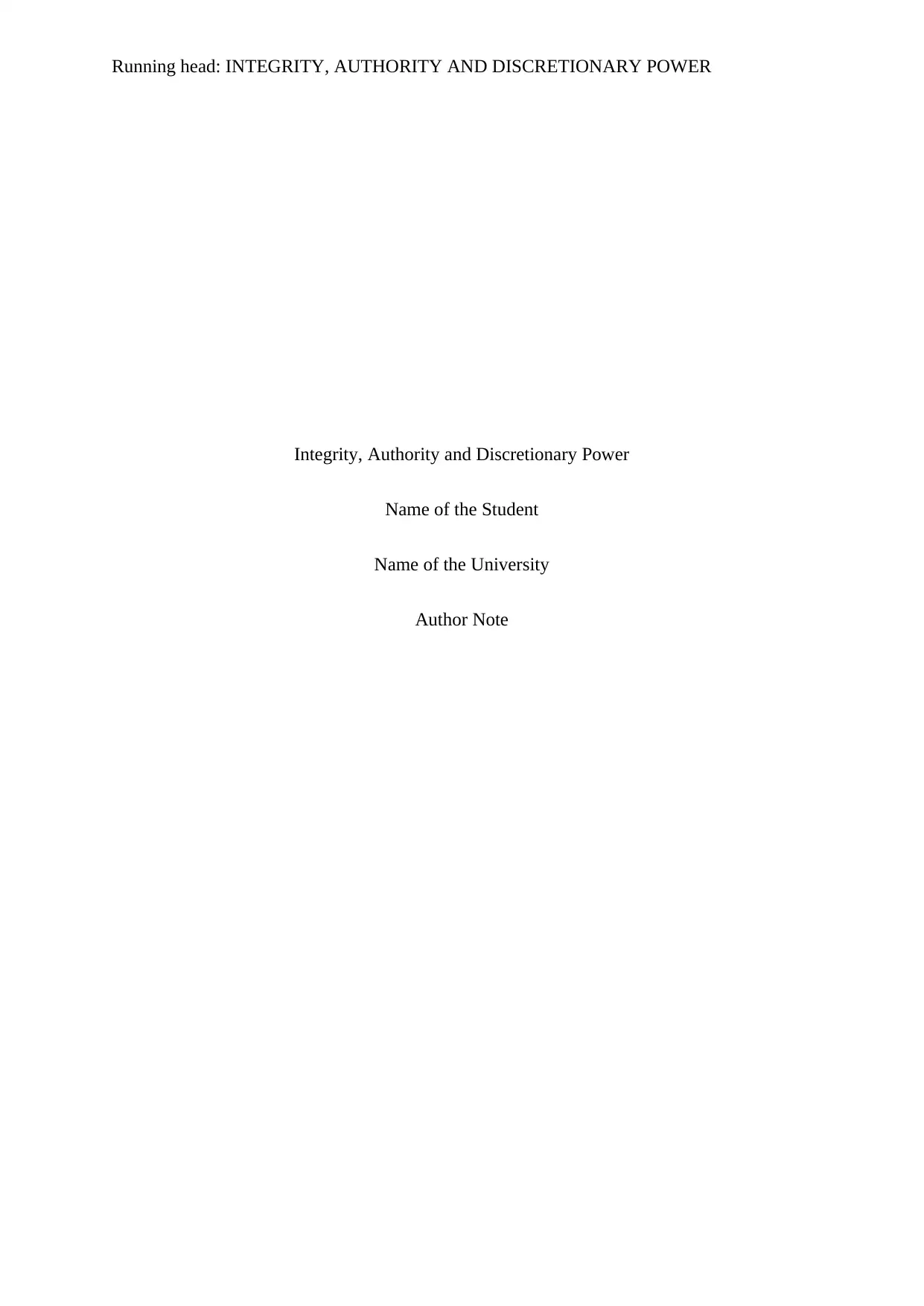
Running head: INTEGRITY, AUTHORITY AND DISCRETIONARY POWER
Integrity, Authority and Discretionary Power
Name of the Student
Name of the University
Author Note
Integrity, Authority and Discretionary Power
Name of the Student
Name of the University
Author Note
Paraphrase This Document
Need a fresh take? Get an instant paraphrase of this document with our AI Paraphraser
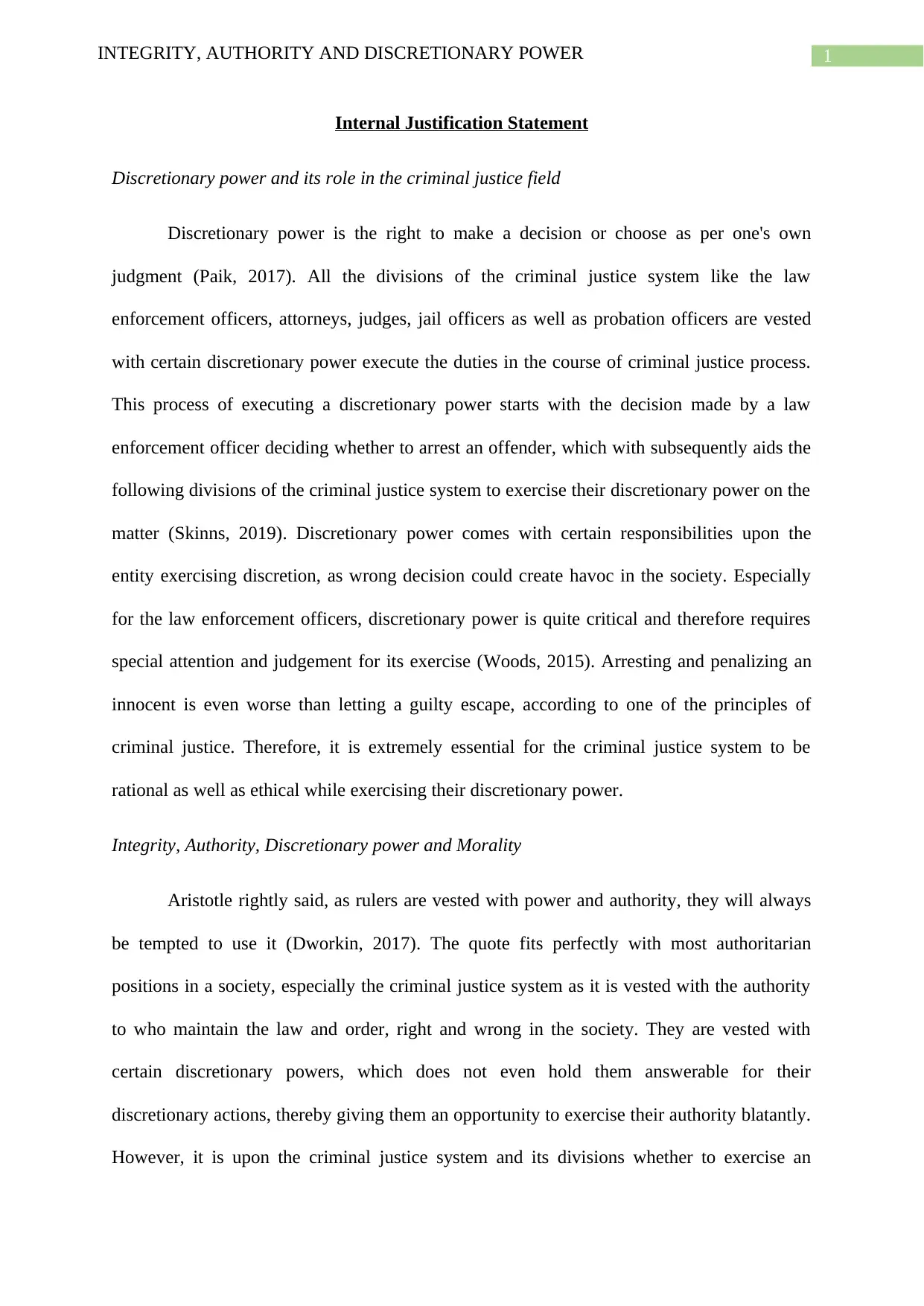
1INTEGRITY, AUTHORITY AND DISCRETIONARY POWER
Internal Justification Statement
Discretionary power and its role in the criminal justice field
Discretionary power is the right to make a decision or choose as per one's own
judgment (Paik, 2017). All the divisions of the criminal justice system like the law
enforcement officers, attorneys, judges, jail officers as well as probation officers are vested
with certain discretionary power execute the duties in the course of criminal justice process.
This process of executing a discretionary power starts with the decision made by a law
enforcement officer deciding whether to arrest an offender, which with subsequently aids the
following divisions of the criminal justice system to exercise their discretionary power on the
matter (Skinns, 2019). Discretionary power comes with certain responsibilities upon the
entity exercising discretion, as wrong decision could create havoc in the society. Especially
for the law enforcement officers, discretionary power is quite critical and therefore requires
special attention and judgement for its exercise (Woods, 2015). Arresting and penalizing an
innocent is even worse than letting a guilty escape, according to one of the principles of
criminal justice. Therefore, it is extremely essential for the criminal justice system to be
rational as well as ethical while exercising their discretionary power.
Integrity, Authority, Discretionary power and Morality
Aristotle rightly said, as rulers are vested with power and authority, they will always
be tempted to use it (Dworkin, 2017). The quote fits perfectly with most authoritarian
positions in a society, especially the criminal justice system as it is vested with the authority
to who maintain the law and order, right and wrong in the society. They are vested with
certain discretionary powers, which does not even hold them answerable for their
discretionary actions, thereby giving them an opportunity to exercise their authority blatantly.
However, it is upon the criminal justice system and its divisions whether to exercise an
Internal Justification Statement
Discretionary power and its role in the criminal justice field
Discretionary power is the right to make a decision or choose as per one's own
judgment (Paik, 2017). All the divisions of the criminal justice system like the law
enforcement officers, attorneys, judges, jail officers as well as probation officers are vested
with certain discretionary power execute the duties in the course of criminal justice process.
This process of executing a discretionary power starts with the decision made by a law
enforcement officer deciding whether to arrest an offender, which with subsequently aids the
following divisions of the criminal justice system to exercise their discretionary power on the
matter (Skinns, 2019). Discretionary power comes with certain responsibilities upon the
entity exercising discretion, as wrong decision could create havoc in the society. Especially
for the law enforcement officers, discretionary power is quite critical and therefore requires
special attention and judgement for its exercise (Woods, 2015). Arresting and penalizing an
innocent is even worse than letting a guilty escape, according to one of the principles of
criminal justice. Therefore, it is extremely essential for the criminal justice system to be
rational as well as ethical while exercising their discretionary power.
Integrity, Authority, Discretionary power and Morality
Aristotle rightly said, as rulers are vested with power and authority, they will always
be tempted to use it (Dworkin, 2017). The quote fits perfectly with most authoritarian
positions in a society, especially the criminal justice system as it is vested with the authority
to who maintain the law and order, right and wrong in the society. They are vested with
certain discretionary powers, which does not even hold them answerable for their
discretionary actions, thereby giving them an opportunity to exercise their authority blatantly.
However, it is upon the criminal justice system and its divisions whether to exercise an
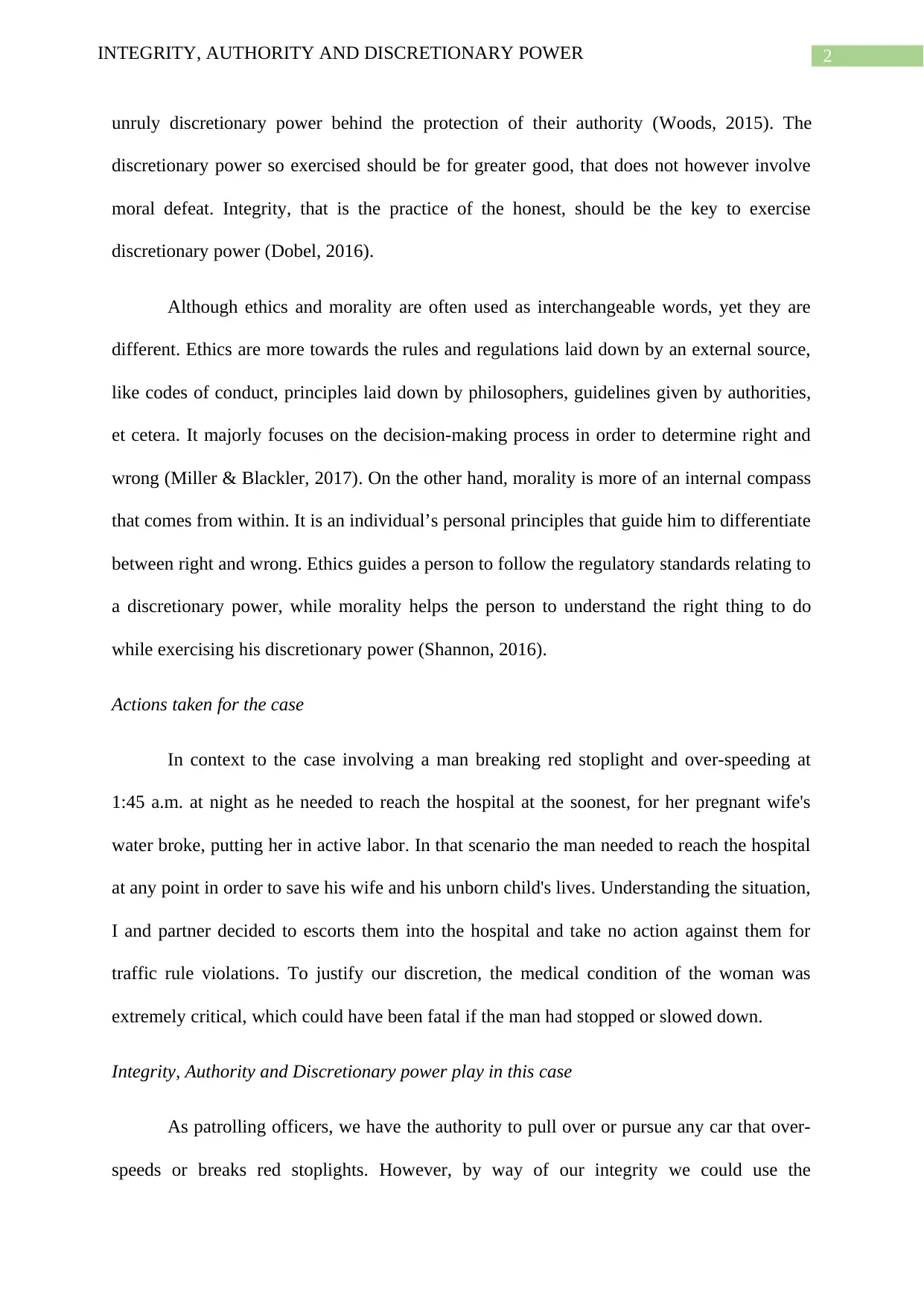
2INTEGRITY, AUTHORITY AND DISCRETIONARY POWER
unruly discretionary power behind the protection of their authority (Woods, 2015). The
discretionary power so exercised should be for greater good, that does not however involve
moral defeat. Integrity, that is the practice of the honest, should be the key to exercise
discretionary power (Dobel, 2016).
Although ethics and morality are often used as interchangeable words, yet they are
different. Ethics are more towards the rules and regulations laid down by an external source,
like codes of conduct, principles laid down by philosophers, guidelines given by authorities,
et cetera. It majorly focuses on the decision-making process in order to determine right and
wrong (Miller & Blackler, 2017). On the other hand, morality is more of an internal compass
that comes from within. It is an individual’s personal principles that guide him to differentiate
between right and wrong. Ethics guides a person to follow the regulatory standards relating to
a discretionary power, while morality helps the person to understand the right thing to do
while exercising his discretionary power (Shannon, 2016).
Actions taken for the case
In context to the case involving a man breaking red stoplight and over-speeding at
1:45 a.m. at night as he needed to reach the hospital at the soonest, for her pregnant wife's
water broke, putting her in active labor. In that scenario the man needed to reach the hospital
at any point in order to save his wife and his unborn child's lives. Understanding the situation,
I and partner decided to escorts them into the hospital and take no action against them for
traffic rule violations. To justify our discretion, the medical condition of the woman was
extremely critical, which could have been fatal if the man had stopped or slowed down.
Integrity, Authority and Discretionary power play in this case
As patrolling officers, we have the authority to pull over or pursue any car that over-
speeds or breaks red stoplights. However, by way of our integrity we could use the
unruly discretionary power behind the protection of their authority (Woods, 2015). The
discretionary power so exercised should be for greater good, that does not however involve
moral defeat. Integrity, that is the practice of the honest, should be the key to exercise
discretionary power (Dobel, 2016).
Although ethics and morality are often used as interchangeable words, yet they are
different. Ethics are more towards the rules and regulations laid down by an external source,
like codes of conduct, principles laid down by philosophers, guidelines given by authorities,
et cetera. It majorly focuses on the decision-making process in order to determine right and
wrong (Miller & Blackler, 2017). On the other hand, morality is more of an internal compass
that comes from within. It is an individual’s personal principles that guide him to differentiate
between right and wrong. Ethics guides a person to follow the regulatory standards relating to
a discretionary power, while morality helps the person to understand the right thing to do
while exercising his discretionary power (Shannon, 2016).
Actions taken for the case
In context to the case involving a man breaking red stoplight and over-speeding at
1:45 a.m. at night as he needed to reach the hospital at the soonest, for her pregnant wife's
water broke, putting her in active labor. In that scenario the man needed to reach the hospital
at any point in order to save his wife and his unborn child's lives. Understanding the situation,
I and partner decided to escorts them into the hospital and take no action against them for
traffic rule violations. To justify our discretion, the medical condition of the woman was
extremely critical, which could have been fatal if the man had stopped or slowed down.
Integrity, Authority and Discretionary power play in this case
As patrolling officers, we have the authority to pull over or pursue any car that over-
speeds or breaks red stoplights. However, by way of our integrity we could use the
⊘ This is a preview!⊘
Do you want full access?
Subscribe today to unlock all pages.

Trusted by 1+ million students worldwide
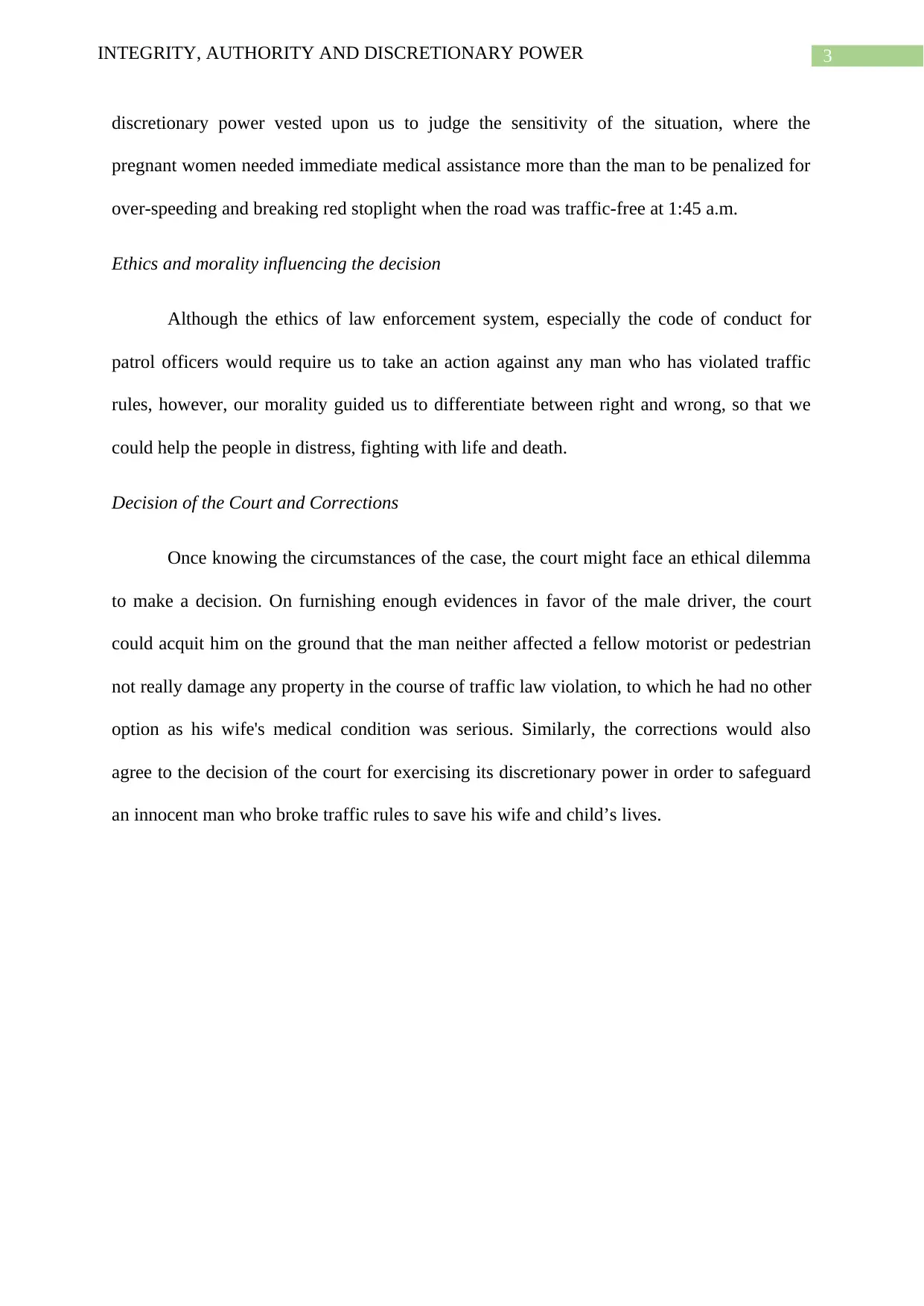
3INTEGRITY, AUTHORITY AND DISCRETIONARY POWER
discretionary power vested upon us to judge the sensitivity of the situation, where the
pregnant women needed immediate medical assistance more than the man to be penalized for
over-speeding and breaking red stoplight when the road was traffic-free at 1:45 a.m.
Ethics and morality influencing the decision
Although the ethics of law enforcement system, especially the code of conduct for
patrol officers would require us to take an action against any man who has violated traffic
rules, however, our morality guided us to differentiate between right and wrong, so that we
could help the people in distress, fighting with life and death.
Decision of the Court and Corrections
Once knowing the circumstances of the case, the court might face an ethical dilemma
to make a decision. On furnishing enough evidences in favor of the male driver, the court
could acquit him on the ground that the man neither affected a fellow motorist or pedestrian
not really damage any property in the course of traffic law violation, to which he had no other
option as his wife's medical condition was serious. Similarly, the corrections would also
agree to the decision of the court for exercising its discretionary power in order to safeguard
an innocent man who broke traffic rules to save his wife and child’s lives.
discretionary power vested upon us to judge the sensitivity of the situation, where the
pregnant women needed immediate medical assistance more than the man to be penalized for
over-speeding and breaking red stoplight when the road was traffic-free at 1:45 a.m.
Ethics and morality influencing the decision
Although the ethics of law enforcement system, especially the code of conduct for
patrol officers would require us to take an action against any man who has violated traffic
rules, however, our morality guided us to differentiate between right and wrong, so that we
could help the people in distress, fighting with life and death.
Decision of the Court and Corrections
Once knowing the circumstances of the case, the court might face an ethical dilemma
to make a decision. On furnishing enough evidences in favor of the male driver, the court
could acquit him on the ground that the man neither affected a fellow motorist or pedestrian
not really damage any property in the course of traffic law violation, to which he had no other
option as his wife's medical condition was serious. Similarly, the corrections would also
agree to the decision of the court for exercising its discretionary power in order to safeguard
an innocent man who broke traffic rules to save his wife and child’s lives.
Paraphrase This Document
Need a fresh take? Get an instant paraphrase of this document with our AI Paraphraser
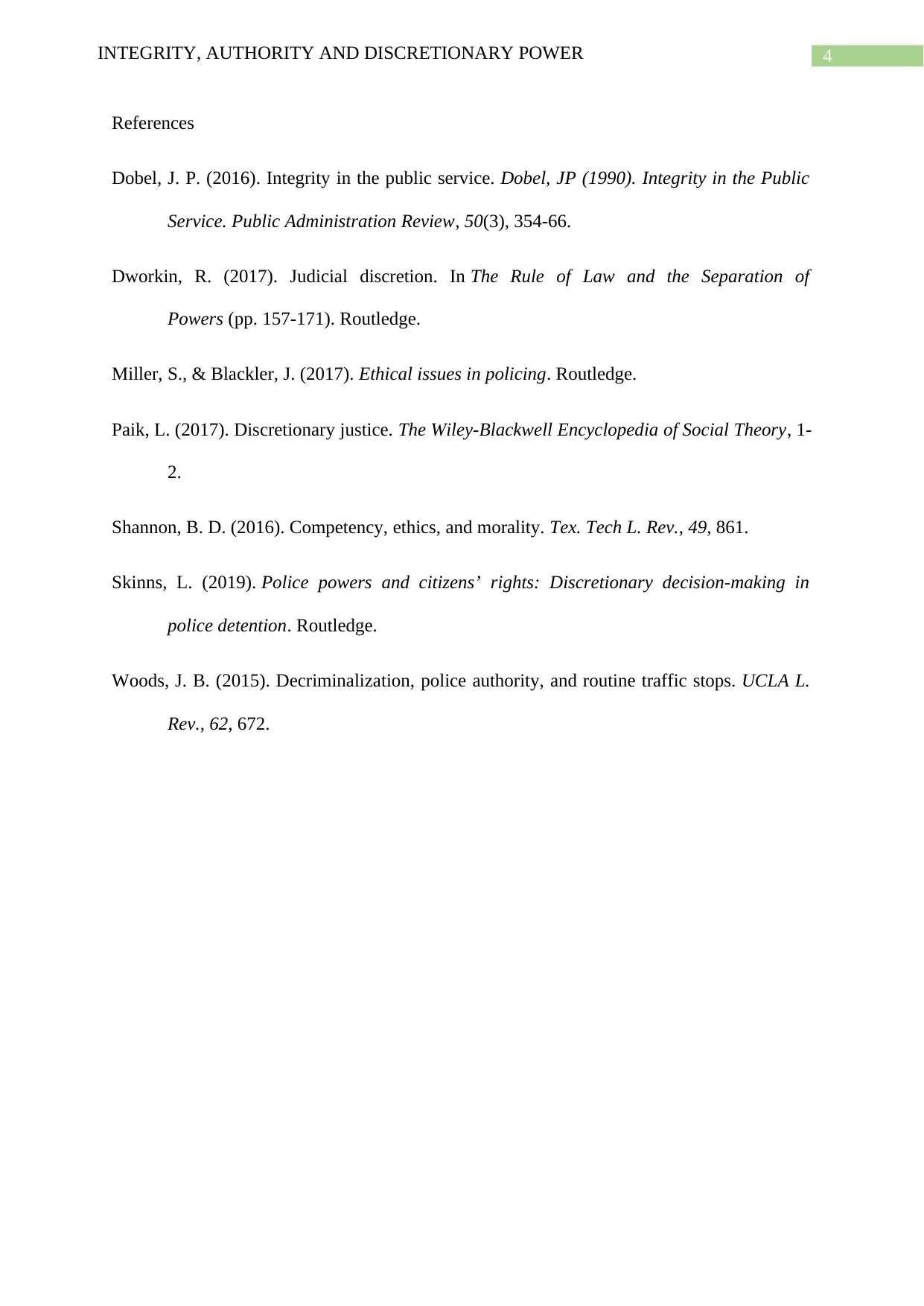
4INTEGRITY, AUTHORITY AND DISCRETIONARY POWER
References
Dobel, J. P. (2016). Integrity in the public service. Dobel, JP (1990). Integrity in the Public
Service. Public Administration Review, 50(3), 354-66.
Dworkin, R. (2017). Judicial discretion. In The Rule of Law and the Separation of
Powers (pp. 157-171). Routledge.
Miller, S., & Blackler, J. (2017). Ethical issues in policing. Routledge.
Paik, L. (2017). Discretionary justice. The Wiley‐Blackwell Encyclopedia of Social Theory, 1-
2.
Shannon, B. D. (2016). Competency, ethics, and morality. Tex. Tech L. Rev., 49, 861.
Skinns, L. (2019). Police powers and citizens’ rights: Discretionary decision-making in
police detention. Routledge.
Woods, J. B. (2015). Decriminalization, police authority, and routine traffic stops. UCLA L.
Rev., 62, 672.
References
Dobel, J. P. (2016). Integrity in the public service. Dobel, JP (1990). Integrity in the Public
Service. Public Administration Review, 50(3), 354-66.
Dworkin, R. (2017). Judicial discretion. In The Rule of Law and the Separation of
Powers (pp. 157-171). Routledge.
Miller, S., & Blackler, J. (2017). Ethical issues in policing. Routledge.
Paik, L. (2017). Discretionary justice. The Wiley‐Blackwell Encyclopedia of Social Theory, 1-
2.
Shannon, B. D. (2016). Competency, ethics, and morality. Tex. Tech L. Rev., 49, 861.
Skinns, L. (2019). Police powers and citizens’ rights: Discretionary decision-making in
police detention. Routledge.
Woods, J. B. (2015). Decriminalization, police authority, and routine traffic stops. UCLA L.
Rev., 62, 672.
1 out of 5
Related Documents
Your All-in-One AI-Powered Toolkit for Academic Success.
+13062052269
info@desklib.com
Available 24*7 on WhatsApp / Email
![[object Object]](/_next/static/media/star-bottom.7253800d.svg)
Unlock your academic potential
Copyright © 2020–2025 A2Z Services. All Rights Reserved. Developed and managed by ZUCOL.





